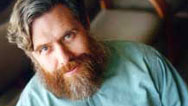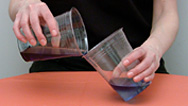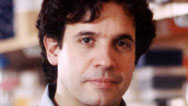Personal Genome Project
- Posted 06.01.08
- NOVA scienceNOW
The Personal Genome Project, spearheaded by George Church of Harvard's Center for Computational Genetics, aims to recruit 100,000 people willing to offer up their DNA and personal life histories. It's all in an effort to further knowledge of human genetics and why we get—or don't get—diseases.
Transcript
Personal Genome Project
Posted: June 1, 2008
NARRATOR: Heart attack. Cancer. Diabetes. We'd all love to avoid these big killer diseases, but doctors still don't know exactly what causes them. They know it has something to do with our genes—but how much?
DAVID ALTSHULER: When we say diabetes or heart attack or cancer or asthma are genetic, we mean that there are a lot of genes. They each have often small effects that add up—that lifestyle and environment matter, and a big dose of random chance.
NARRATOR: Before they can untangle the complex web of causes, researchers will need to get their hands on a lot more data. And George Church is trying to get that data – through the "Personal Genome Project."
GEORGE CHURCH: So the Personal Genome Project is aimed at not just providing-- personal genomics, but actually providing the information that will help interpret it.
NARRATOR: Church is trying to recruit 100,000 people to donate their DNA and share intimate details about their lives, revealing not just their personal traits and medical history but life history—environments, habits, and behavior. Anything that could conceivably influence their getting—or not getting—a disease.
GEORGE CHURCH: If people are willing to share not just their DNA, but their traits and their environments, then we can make correlations.
NARRATOR: And when Church asks for your DNA, he means all of it, not just the million or so markers that most genomics companies currently screen for. Church plans to read out all of the coding regions for all 20,000 of your genes—a task that will only be possible with the next generation of faster, cheaper DNA sequencers.
GEORGE CHURCH: This is the-- the-- the latest sequencing devices. We fondly call it, "The Pollinator" –for Polymerase Colony Sequenator.
NARRATOR: Within a few years, sequencing all your DNA could be as cheap as $1000.
RUDY TANZI: The value of being able to sequence everybody's genome for a reasonable amount of money for scientific research is immeasurable. To actually have the entire sequence of all three billion bases of each person's DNA so you can see all the differences from one person to another, that's the Holy Grail, I mean, it would be amazing.
NARRATOR: With a hundred thousand genomes, combined with detailed personal information, Church believes we'll have a much better chance at getting at the root causes of the common diseases and figuring out how to prevent them before they strike.
GEORGE CHURCH: I sincerely hope that this is the signaling event that will either by itself, or by some kind of impact it will have on our way of thinking will cause us to have a revolution in medicine.
Credits
Production Credits
- Produced by
- Julia Cort
- Edited and narrated by
- Melissa Salpietra
- Original footage and interviews for NOVA scienceNOW produced by
- Julia Cort
- Stock footage provided by
- istockphoto.com
Related Links
-

Public Genomes
Many people are paying to have their DNA tested. Others are sharing their genomes on the Internet. Are they crazy?
-

Public Genomes: Expert Q&A
George Church, founder of the Personal Genome Project, answers questions about it and other issues of DNA testing.
-

Extract Your Own DNA
Behold your very own DNA in this do-it-yourself science experiment.
-

Personal DNA Testing: Expert Q&A
Harvard geneticist Rudy Tanzi offers caveats about commercial DNA testing and addresses a wide range of questions.



